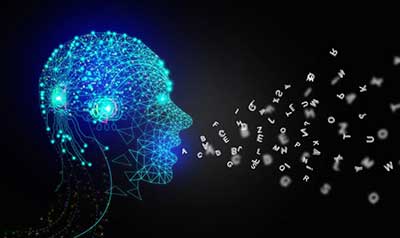Date : 18/12/2023
Relevance: GS Paper 3 – Science and Technology
Keywords: ChatGPT, Legal domain, SUVAS, SUPACE
Context-
In a groundbreaking move, the judiciary in England and Wales has embraced the use of generative Artificial Intelligence (AI) systems, such as ChatGPT, to assist judges in performing basic tasks. The guidance, issued on December 12, outlines the permissible applications of AI, emphasizing its use for tasks like summarizing extensive texts, creating presentations, and composing emails. However, the guidance also issues warnings and precautions to judges, highlighting potential risks and limitations associated with the use of AI in the legal domain.
Guidance for Judicial Office Holders:
The document, titled "Guidance for Judicial Office Holders," places a strong emphasis on the need for any AI use to be consistent with the judiciary's overarching obligation to protect the integrity of the administration of justice. While acknowledging the potential benefits of AI, the guidelines caution judges against relying on chatbots for legal research or analysis. Recent cases in the US and Britain serve as a backdrop to these warnings, signaling the need for a nuanced approach to incorporating AI into legal proceedings.
Indicators of AI-Generated Content:
To aid judges in identifying AI-generated content, the guidelines provide specific indicators. References to unfamiliar cases, foreign citations, inconsistent citation of case law for the same legal issues, and persuasive yet flawed arguments are highlighted as potential signs. Additionally, the use of American spellings and references to overseas cases may suggest AI involvement. Judges are urged to exercise vigilance in recognizing these indicators to maintain the integrity of legal proceedings.
Potential Risks and Limitations:
The guidance explicitly addresses the potential risks associated with the use of AI in the judiciary. It points out that public AI chatbots, including ChatGPT, lack access to authoritative or credible databases, relying on algorithms and training data for content generation. The quality of answers is contingent on the nature of prompts and engagement, with the possibility of receiving inaccurate, incomplete, misleading, or biased information. Judges are cautioned against considering AI-generated content as a reliable source for new and unverified information.
Privacy Risks and Mitigation Strategies:
Privacy concerns related to the use of AI are also addressed in the guidelines. Judges are warned against entering private or confidential information into public AI chatbots, highlighting the global visibility of information inputted. Mitigation strategies, such as disabling chat history and restricting AI platforms' access to information, are recommended. In the event of unintentional disclosure, judges are advised to report the incident promptly to the Judicial Office.
Recent Cases and Global Precedents:
On December 4, a court rejected the appeal of a woman who attempted to challenge a capital gains tax penalty using nine "fabricated" ChatGPT cases, as reported by the Independent.
Likewise, in June, two New York lawyers faced sanctions from a US judge for submitting a legal brief containing six fictitious case citations generated by ChatGPT.
arguments.
Indian Judicial Landscape and AI Integration:
Shifting the focus to India, we need to analyze the response of Indian courts to the use of AI. In March, Justice Anoop Chitkara of the Punjab & Haryana High Court sought ChatGPT's response during a bail plea hearing. However, the court clarified that any reference to ChatGPT was intended to provide a broader perspective on bail jurisprudence, recognizing the role of AI as an auxiliary tool.
The Supreme Court of India has also taken steps towards AI integration in the judicial process. The development of the Supreme Court Vidhik Anuvaad Software (SUVAS), a machine-assisted translation tool, aims to translate English judicial documents into eleven vernacular languages, promoting regional languages in legal proceedings. Additionally, the Supreme Court Portal for Assistance in Court's Efficiency (SUPACE), launched by the then-Chief Justice SA Bobde, collects relevant facts and laws to assist judges in their decision-making processes.
About SUPACE
- SUPACE stands for Supreme Court Portal for Assistance in Courts Efficiency. It combines human and artificial intelligence, with a specific emphasis on not influencing decision-making, as stated by Bobde.
- The AI's function is confined to gathering and examining data. While the courts maintain full autonomy and the judge's discretionary power in case resolution, the integration of AI facilitates quicker access to information, expediting the overall legal process
Conclusion
The guidance issued by the UK judiciary marks a significant step in acknowledging the potential of AI in legal processes while outlining the necessary precautions to safeguard the integrity of justice administration. As AI continues to play a role in shaping the global legal landscape, the experiences of the UK, US, and India offer valuable insights into the challenges and opportunities presented by the integration of AI in the judiciary. While AI can enhance efficiency, judges and legal practitioners must remain vigilant to mitigate risks and ensure the responsible use of technology in the pursuit of justice.
Probable Questions for UPSC mains Exam-
- What are the key points in the recent guidance by the judiciary in England and Wales regarding the use of AI, specifically ChatGPT, in legal processes? Discuss the potential benefits, risks, and the challenge of balancing AI adoption with the integrity of justice administration. (10 marks, 150 words)
- Evaluate the impact of Supreme Court initiatives like SUVAS and SUPACE on the efficiency of the Indian judicial process. What challenges and ethical considerations should be addressed for responsible AI use in the judiciary, and how do the approaches of the UK, US, and India compare in embracing AI in legal proceedings? (15 marks, 250 words)
Source- Indian Express








